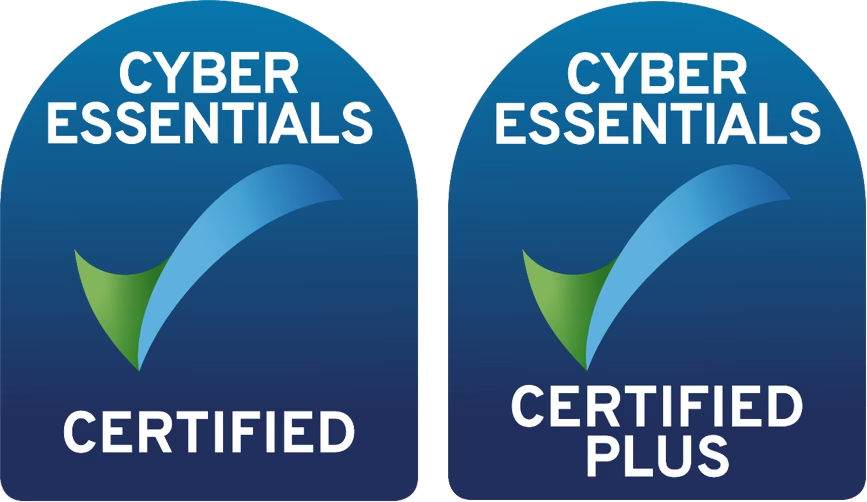The increasing threat of cyber attacks lots of small business owners are asking should they buy Cyber Insurance
Why cyber security and Insurance IT support is essential for small businesses in the face of rising cyber attacks
As cyber attacks become more frequent and sophisticated, cyber security is no longer optional for small businesses. According to Forbes, there were over 623 million cyber attacks worldwide in 2021, an increase of almost 8% from 2020. These attacks can cause significant financial and reputational damage to small businesses, as well as expose them to legal liabilities and regulatory penalties. Therefore, small business owners need to invest in cyber security measures and consider cyber insurance as part of their risk management strategy.
According to official data from the Official Statistics UK Gov – Cyber Security Breaches Survey 2022 (Updated 11 July 2022)

Cyber Attack Type in 2022
Phishing was the most common type of cyber attack, with 39% of businesses experiencing a phishing attack in 2022. Phishing is a type of social engineering attack where attackers send emails that appear to be from a legitimate source in order to trick recipients into clicking on a malicious link or providing sensitive information.
Ransomware attacks were on the rise, with 19% of businesses experiencing a ransomware attack in 2022. Ransomware is a type of malware that encrypts a victim’s files and demands a ransom payment in order to decrypt them.
Malware attacks were also common, with 17% of businesses experiencing a malware attack in 2022. Malware is a type of software that can damage or disable a computer system.
Denial-of-service (DoS) attacks were also common, with 15% of businesses experiencing a DoS attack in 2022. A DoS attack is an attempt to make a computer system or network unavailable to its intended users.
The Frequency Cyber Attacks in 2022
- The average business experienced 1.7 cyber attacks in 2022.
- 31% of businesses were attacked at least once a week.
- 14% of businesses were attacked at least once a day.
The Impact Cyber Attacks in 2022
The average cost of a cyber attack on a UK business was £4,200.
1 in 5 businesses (20%) and charities (19%) say they experienced a negative outcome as a direct consequence of a cyber attack, while one third of businesses (35%) and almost four in ten charities (38%) experienced at least one negative impact.
The most common negative impacts were:
- Loss of data (14%)
- Loss of revenue (13%)
- Loss of productivity (12%)
- Damage to reputation (11%)
These are just some of the key points of interest from the Cyber Security Breaches Survey 2022.
As such the UK government has advised all UK organisations should take basic steps to protect themselves online.

How to protect your business from cyber attacks
Don’t delay – take action to protect your business now. Here are some of the official April 2023 recommendations for UK businesses.
- Cyber security is everyone’s responsibility. All employees should be aware of the risks and take steps to protect the business from cyber attacks.
- Use strong passwords and change them regularly. Passwords should be at least 12 characters long and include a mix of upper and lowercase letters, numbers, and symbols.
- Keep your software up to date. Software updates often include security patches that can help to protect your computer from known vulnerabilities.
- Install a firewall and antivirus software. A firewall can help to block unauthorized access to your computer, while antivirus software can help to detect and remove malware.
- Educate your employees about cyber security risks. Employees should be aware of the latest cyber security threats and how to protect themselves from them.
- Have a plan in place in case of a cyber attack. A plan should include steps to identify, respond to, and recover from a cyber attack.
- Cyber attacks are becoming more sophisticated and common. Businesses of all sizes are at risk, and the cost of a cyber attack can be significant.
There are a number of things businesses can do to protect themselves from cyber attacks such as Cyber Insurance.
The benefits of cyber insurance
Cyber insurance can provide financial protection for businesses in the event of a cyber attack such as:
Financial protection: Cyber insurance can help businesses cover the costs of a cyber attack, such as data recovery, legal fees, and business interruption.
Access to resources: Cyber insurance can provide businesses with access to resources and support in the event of a cyber attack, such as legal advice, forensic investigation, and public relations assistance.
Peace of mind: Cyber insurance can give businesses peace of mind knowing that they are financially protected in the event of a cyber attack.
If you are a business owner, it is important to consider cyber insurance as part of your overall risk management strategy.
Cyber attacks are becoming more and more common, and cyber insurance can help to protect your business from the financial and reputational damage that can result from a cyber attack. But, should you still buy Cyber Insurance?

Should Businesses in the UK still Buy Cyber Insurance?
Whether or not businesses in the UK should still buy cyber insurance is a complex question with no easy answer.
There are a number of factors to consider, including the size and nature of the business, the level of risk it faces, and the cost of cyber insurance.
Here are some factors that small businesses should consider when deciding whether or not to buy cyber insurance:
The size and nature of the business – Cyber Insurance for Small UK Businesses
Small businesses may not have the resources to invest in robust cybersecurity measures. Cyber insurance can help to protect small businesses from the financial and reputational damage that can result from a cyber attack, even if the business is not able to fully mitigate the risk.
Small businesses may be more likely to be targeted by cyber criminals. Cyber criminals often target small businesses because they believe that they are less likely to have strong cybersecurity measures in place.
Cyber insurance can help small businesses to recover from a cyber attack. If a small business is the victim of a cyber attack, cyber insurance can help to cover the costs of data recovery, legal fees, and business interruption. This can help the business to get back on its feet as quickly as possible.
The level of risk the business faces – Cyber Insurance for Small UK Businesses
Businesses that operate in certain industries, such as healthcare hospitality or finance, are at a higher risk of a cyber attack. This is because these industries handle sensitive data that is valuable to cyber criminals.
Overall, cyber insurance can be a valuable tool for small businesses to protect themselves from the financial and reputational damage that can result from a cyber attack.
The cost of cyber insurance – Cyber Insurance for Small UK Businesses
The cost of cyber insurance can vary depending on the size and nature of the business. However, according to a recent study by the National Cyber Security Centre (NCSC), the average cost of cyber insurance for small businesses in the UK is £2,500 per year.
Ultimately, the decision of whether or not to buy cyber insurance is a decision that should be made by each business on a case-by-case basis. However, for businesses that are at risk of a cyber attack, cyber insurance can be a valuable tool for protecting their data and their bottom line.
How can small UK businesses save on Cyber Insurance?
Here are some additional tips for businesses that are considering buying cyber insurance:
Increase security measures. Businesses can reduce the cost of cyber insurance by increasing their security measures. This can include things like implementing a firewall, using strong passwords, and training employees on cyber security.
Get quotes from multiple insurers. Businesses can get quotes from multiple insurers to find the best deal on cyber insurance.
Buy a group policy. Businesses can buy a group policy with other businesses to get a discount on cyber insurance.
Take advantage of discounts. Some insurers offer discounts for businesses that have certain security measures in place, such as a firewall or employee training.
Consider self-insurance. Self-insurance is when a business sets aside money to cover the costs of a cyber attack. This can be a good option for businesses that have the financial resources to do so.
Compare the terms and conditions of different policies.
Make sure the policy covers the risks that are most relevant to your business.
Ask about the claims process.
Finally, make sure you understand the deductible and the maximum payout.
Speedster IT can help you improve your business security measures.
We offer a variety of services to help you protect your data and systems from cyber threats. Our experts can advise you on the best security measures for your business and implement them for you. We also offer ongoing support to help you keep your security measures up-to-date.
If you are interested in learning more about our services, please contact us today. We would be happy to discuss your specific needs and provide you with a free quote.
Here are some of the services that Speedster IT offers to reduce the costs of your Cyber Insurance
- Security assessments: We can assess your current security posture and identify any vulnerabilities.
- Security implementation: We can implement security measures, such as firewalls, intrusion detection systems, and data encryption.
- Security training: We can train your employees on how to identify and avoid cyber threats.
- Security monitoring: We can monitor your systems for signs of attack and respond quickly to incidents.
By working with Speedster IT, you can rest assured that your business is protected from cyber threats. We have the expertise and experience to help you implement effective security measures and keep your data safe.
Get a Fast Quote
With over 15 years at Speedster IT, I’ve built a career around helping businesses navigate the evolving world of technology. I publish all the content for the IT Support London Blog and Cyber Security Blog, where I share practical insights on infrastructure upgrades, cybersecurity trends, and smart IT strategies for growing companies.
